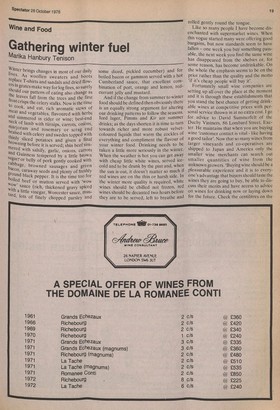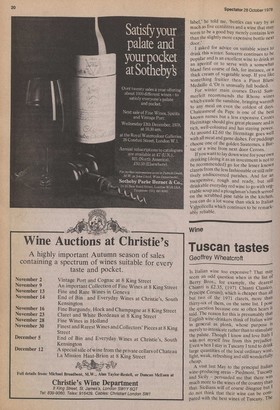Wine and Food
Gathering winter fuel
Manka Hanbury Tenison W. inter brings changes in most of our daily lives. As woollen sweaters and boots replace T-shirts and sandals and dried flowers in grates make way for log fires, so surely should our pattern of eating also change as the leaves fall from the trees and the first frost crisps the celery stalks. Now is the time to Cook, and eat, rich aromatic stews of meat and vegetables, flavoured with herbs and simmered in cider or wine; best-end neck of lamb with turnips, carrots, onions, marjoram and rosemary or scrag end braised with celery and swedes topped with thinly sliced potatoes and given a final browning before it is served; shin beef simmered with salsify, garlic, onions, carrots and Guinness tempered by a little brown sugar :or belly of pork gently cooked with cabbage, browned sausages and green bacon, caraway seeds and plenty of freshly ground black pepper. It is the time too for boiled beef or mutton served with 'wow WOW' sauce (rich, thickened gravy spiced with a little vinegar, Worcester sauce, mustard, lots of finely chopped parsley and 1111.1.111 some diced, pickled cucumber) and for boiled bacon or gammon served with a hot Cumberland sauce, that excellent combination of port, orange and lemon, redcurrant jelly and mustard. And if the change from summer to winter food should be defined then obviously there is an equally strong argument for altering our drinking patterns to follow the seasons. Iced lager, Pimms and Kir are summer drinks; as the days shorten it is time to turn towards richer and more robust velvet coloured liquids that warm the cockles of everything and compliment the flavour of your winter food. Drinking needs to be taken a little more seriously in the winter. When the weather is hot you can get away with cheap little white wines, served icecold and to be drunk by the pint and, when the sun is out, it doesn't matter so much if red wines are on the thin or harsh side. In the winter more quality is required, white wines should be chilled not frozen, red wines should be decanted two hours before they are to be served, left to breathe and rolled gently round the tongue. Like so many people I have become disenchanted with supermarket wines. When this vogue started many were offering good bargains, but now standards seem to have fallen — one week you buy something passable, the next week you find the same wine has disappeared from the shelves or, for some reason, has become undrinkable. On the whole the emphasis seems to be on the price rather than the quality and the motto 'if it's cheap people will buy it'. Fortunately small wine companies are setting up all over the place at the moment and it is through these establishments that you stand the best chance of getting drinkable wines at competitive prices with personal service thrown in at no extra cost. I go for advice to David Summerfelt of the Duchy Vintners, 86 Lombard Street, Exeter. He maintains that when you are buying wine 'customer contact is vital like having a good tailor'. Now that so many wines from larger vineyards and co-operatives are shipped to Japan and America only the smaller wine merchants can search out smaller quantities of wine from the unknown growers. 'Buying wine should be a pleasurable experience and it is to everyone's advantage that buyers should taste the wines they are going to buy, be able to discuss their merits and have access to advice on wines for drinking now or laying down for the future. Check the centilitres on the label,' he told me, 'bottles can vary by as much as five centilitres and a wine that may seem to be a good buy merely contains less than the slightly more expensive bottle next door.'
I asked for advice on suitable wines to drink this winter. Sancerre continues to be popular and is an excellent wine to drink as an aperitif or to serve with a somewhat bland first course of fish, for instance, or a thick cream of vegetable soup. If you like something fruitier then a Pinot Blanc Medailled:Or is unusually full bodied.
For winter main courses David Sum merfelt recommends the Rhone wines which exude the sunshine, bringing warmth to any meal on even the coldest of days. Chateauneuf du Pape is one of the best known names but a less expensive Crozes Hermitage should give great pleasure and is rich, well-coloured and has staying power. At around £2.60 the Hermitage goes well with all meat and game dishes. For puddings choose one of the golden Sauternes, a Barsac or a wine from next door Cerons.
If you want to lay down wine for your own drinking (doing it as an investment is not to be recommended) go for the lesser known clarets from the less fashionable or still relatively undiscovered parishes. And for an p nsive, rough and ready, but still inexpensive, everyday red wine to go with vegetable soup and a ploughman's lunch served on the scrubbed pine table in the kitchen, you can do a lot worse than stick to Italian Val policella which continues to be remarkably reliable.







































 Previous page
Previous page